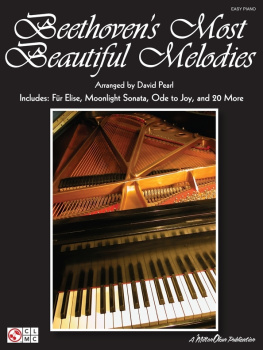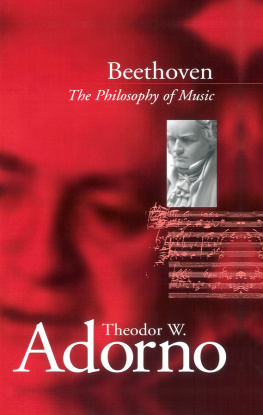Beethoven and the Grosse Fuge
Music, Meaning, and Beethovens
Most Difficult Work
Robert S. Kahn

SCARECROW PRESS, INC.
Published in the United States of America
by Scarecrow Press, Inc.
A wholly owned subsidiary of
The Rowman & Littlefield Publishing Group, Inc.
4501 Forbes Boulevard, Suite 200, Lanham, Maryland 20706
www.scarecrowpress.com
Estover Road
Plymouth PL6 7PY
United Kingdom
Copyright 2010 by Robert S. Kahn
All rights reserved. No part of this publication may be reproduced, stored in a retrieval system, or transmitted in any form or by any means, electronic, mechanical, photocopying, recording, or otherwise, without the prior permission of the publisher.
British Library Cataloguing in Publication Information Available
Library of Congress Cataloging-in-Publication Data
Kahn, Robert S.
Beethoven and the Grosse Fuge : music, meaning, and Beethovens most difficult work / Robert S. Kahn.
p. cm.
Includes bibliographical references and index.
ISBN 978-0-8108-7418-3 (pbk. : alk. paper)
1. Beethoven, Ludwig van, 17701827. Grosse Fuge, string quartet. 2. Beethoven, Ludwig van, 17701827Criticism and interpretation. 3. Beethoven, Ludwig van, 17701827. I. Title.
ML410.B42K34 2010
785'.7194dc22
2010008032
 The paper used in this publication meets the minimum requirements of American National Standard for Information SciencesPermanence of Paper for Printed Library Materials, ANSI/NISO Z39.48-1992.
The paper used in this publication meets the minimum requirements of American National Standard for Information SciencesPermanence of Paper for Printed Library Materials, ANSI/NISO Z39.48-1992.
Manufactured in the United States of America.
For
Jane Krochmalny
Contents
Preface
Since Beethovens day the gap between the general lover of concert music and the contemporary composer has widened into a gulf, and in the twentieth century the gulf became a chasm. The same gulf has opened between the general reader about music and the works of music historians and music theorists, who often write in a language nearly incomprehensible to the general reader.
A writer who tries to bridge this gulf is likely to be derided as a popularizer, while standing little chance of truly becoming popular.
This is an unfortunate situation: for composers, for music lovers, for historians of music, and for people with a love of culture and reading.
Beethoven and the Grosse Fuge: Music, Meaning, and Beethovens Most Difficult Work is written for people on both sides of that gap, and for those in the middle. It is for people who love music, and think about it, and believe that great music bears with it something important, though what that thing may be is elusive, perhaps unsayable.
I first heard Beethovens Grosse Fuge thirty-five years ago as a graduate student at the Manhattan School of Music. I have not been able to stop thinking about it since then. I have been contemplating and planning this book since then. It is a reaction to the Grosse Fuge, an attempt to answer the question which the piece must raise in the mind of anyone who listens to it. That question is: What in Gods name is going on here?
I fell in love with the Grosse Fuge at once. But my brain asked a second question. Granted that the piece works; granted that it is the most powerful music Beethoven ever wroteand that means, in effect, the most powerful music anyone ever wrotestill: Why would anyone write something like this?
This book is the shortest answer I could come up with.
Beethoven has been subjected to more than two centuries of intense scrutiny. Yet some aspects of Beethovens life, and some aspects of the Grosse Fuge, have not been revealed with sufficient clarity, possibly because they are in plain sight. This book offers three propositions about Beethovens life, and three about his music.
First, that the Grosse Fugenot the substitute finale that Beethoven wrote at the insistence of his publisherbelongs as the finale to his Opus 130 String Quartet in B-Flat, and that there is no evidence that Beethoven ever intended anything else.
Second, that the creative dry period that Beethoven suffered in his mid- to late fortiesroughly from 1814 through 1819was caused by depression.
Third, that though Beethoven clearly was an eccentric man, many of his quirks, including his furies and resentments, were rational reactions to a social and economic system that was stacked against the independent composer.
These aspects of Beethovens life are treated in the first three chapters.
therefore addresses the question of what it means to ask whether absolute musicmusic without wordscan have meaning.
I take the position that absolute music can have meaning, but it usually does not. Only in exceptional cases does music rise to that level, and even when it does, as in Beethovens Late Quartets, the meaning may be untranslatable.
Second, I propose that in some cases normal musical perception can be a form of synesthesia. By normal musical perception I mean the manner in which an average human being listens to music and responds to it. By synesthesia I mean one mode of perceptionhearingbeing perceived as directed motion through volumes of space. This synesthetic mode of listening seems to occur most often with polyphonic works and in some compositions of the Vienna Classic period.
By hearing interpreted as motion through space I do not mean the motion of a violinists arm, or the direction a sound comes from, or the space of a concert hall. Nor do I mean that Beethoven was synesthetic, or that musicians or listeners need be synesthetic to understand music. I mean that the manner in which people appreciate some forms of music, particularly some pieces of Western Classic and Baroque music, involves the creation of a synesthetic space: a three-or four-dimensional volume through which sound moves. The synesthetic creation, or mode of perception, is the intuited sense of spacesometimes tremendous spacethrough which sound appears to move, with direction. That this has not previously been called a form of synesthesia I attribute to the fact that humans have come to take this form of perception for granted, and have not observed what a remarkable thing it is.
The book concludes by observing that the theme of the Grosse Fuge, its structure and the transformations through which Beethoven develops it, resemble the structure and transformations of DNA.
I would like to thank Jane Krochmalny, for everything; my sister, Debbie Price; composer-arranger-virtuoso Kenny Goldberg, for his encouragement during the many years it took to write the book; Fred Rivera, for moral courage; Victoria Graham, for help with the word processing; musicologist Mary Ann Morrow, for kindly responding to emails from a stranger inquiring about rehearsal practices in Classical Vienna; Dr. Oliver Sacks, for taking time from his busy schedule to read and comment on the book; and Rene Camus, Jayme Bart-les Reed, Sally Craley, and all the editorial and production workers at Scarecrow Press.
Chapter 1
Beethoven and the Grosse Fuge
If Beethoven did not exist, and someone found it necessary to invent him, no one would believe it. That the central figure in Western music would write his greatest works after becoming deaf is unlikely. Also unlikely is that his greatest work would receive just three public performances in the seventy-five years after it was written, and that nearly two centuries after the composers death, few people, even among his admirers, would know his greatest composition, and even fewer would like it upon first hearing. But that also seems to be the case.













 The paper used in this publication meets the minimum requirements of American National Standard for Information SciencesPermanence of Paper for Printed Library Materials, ANSI/NISO Z39.48-1992.
The paper used in this publication meets the minimum requirements of American National Standard for Information SciencesPermanence of Paper for Printed Library Materials, ANSI/NISO Z39.48-1992.